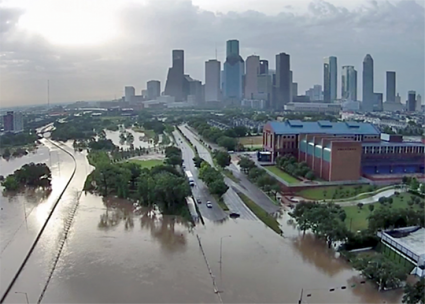The flooded landscape of 21st century capitalism
September 6, 2017
Fred Magdoff is co-author of
Creating an Ecological Society: Toward a Revolutionary Transformation, with Chris Williams, and
What Every Environmentalist Needs to Know about Capitalism, with John Bellamy Foster. He talked to
Michael Ware
about the causes of the catastrophe that has struck Houston and the
Gulf Coast--and what it will take to prevent similar tragedies in the
future.

IS THERE reason to believe that global warming made Hurricane Harvey more intense than it would have been?
YES, ABSOLUTELY. The oceans are warmer, and the Gulf of Mexico in
particular has warmed significantly--this year is the warmest of all.
The warmer the water, the more easily water can evaporate, and a
warmer atmosphere can hold more water, so you have that aspect as well.
Storms in general have been getting more intense--not just this
particularly intense storm.
There's another factor as well: The poles are warming faster than the
middle of the earth, causing less of a gradient between the
temperatures in both places. This affects the atmospheric transfer--that
is, the jet streams. One of the predicted effects of this is that
weather patterns will slow down--things won't move as fast as they
normally would.
This is one of the factors that made Harvey so devastating: it stuck
around. It moved a little bit, but in a circle, and it made landfall
again and again. I wouldn't be surprised if this is part of the reason
why it stayed so long before it started moving out toward the Northeast.
That's also an effect of human activity and global warming.
But the major factor is that there's more evaporation from the large
bodies of water, the atmosphere holds more water, and we have more
intense storms in general.
HOW DID capitalist development in Houston make the
effects of the storm even worse? Also, there are more than 1,000 people
dead in in South Asia--why are the floods like those in Bangladesh,
India and Nepal also more deadly?
I CAN'T speak as much to the impact in Asia or the specifics of the
geography as I can about Houston. But this was also the result of a
monsoon, with a similar phenomenon of intense rainfall. Bangladesh is
also affected by rising sea levels, but the disaster is also affecting
northern Bangladesh, away from the coast.
As for Houston--and it's not just Houston, but the surrounding area
in Texas, all the way up the coast toward Louisiana--there has been
incredible development, with the construction of roads and shopping
malls and industries and houses.
This building is taking place on what, in the past, was substantial
open land, some of it grassland and prairie, which is incredibly
absorbent of water. What's happened is a significant portion of this
open land has been paved over or covered over or otherwise made
impermeable.
In Houston itself, there is essentially no zoning whatsoever, so
people can do what they want, wherever they want. It's designed to cause
a disaster. If you wanted to make the effects of a natural disaster
worse, this is how you would go about doing it.
This is one of the underlying issues with regard to capitalism: the
real estate interests are so powerful. And that isn't just a Houston
issue either--it happens in other places. In the book
Creating an Ecological Society
that I wrote with Chris Williams, we have a section on unnatural
natural disasters, where we talk about something very similar that had
happened last year in Louisiana. We quote a professor at length saying
that this area never should have been developed.
Anyone who was looking at the question dispassionately would have
known this, but the real estate interests convinced governments to allow
it to happen anyway. The real estate interests are quite powerful all
over the country, and they exert a lot of power at the local, state and
regional levels.
So you have an area that's prone to flooding, and one of the means
that this was dealt with in the past--the percolation of water into soil
and the slow release from the groundwater to the bayous--has been
eliminated.
Once you eliminate 30 to 40 percent of the land that once served that
function, every storm immediately becomes worse. There was major
flooding in Houston last year--they called it the Tax Day flood because
it came on April 18, when taxes were due. The year before, it happened
on Memorial Day.
So flooding in Houston is not an unusual issue. This, of course, was
an unusual storm. It's referred to as a 1,000-year storm, meaning it's a
storm that will happen, on average, only once every 1,000 years--or
it's actually more accurate to say that in any given year, there's a a
0.1 percent chance of a storm this severe taking place. And in 2016 and
2015, there were 500-year storms.
That's my take. You have capitalism affecting the climate through
global warming and affecting the built environment through real estate
development, both of which make a whole region more vulnerable to
flooding.
AND NOT only did this development turn Houston into a
kind of bathtub without a large enough drain, but there wasn't really a
plan in place to deal with the flooding--even after the previous
flooding in Houston or the disasters following Sandy and Katrina. So
what do we have to do differently in the future to both protect people
and provide relief immediately when these disasters happen?
THERE'S A lot more that can be done than is being done. But some of it
is
being done, carried out by regular folks. Disasters like this generally
bring out the best in people. There are a lot of volunteers helping to
rescue people or feed people in the various shelters that they have set
up. Charities and Texas state and Houston employees are helping. And the
federal government will help some through FEMA.
But they're saying that 100,000 homes in Houston that have been
flooded. I have no idea whether that's accurate. And that's just
Houston--there are many other locations around Houston and all the way
up the coast to the northeast that have been flooded as well, and very
few residents have flood insurance.
If you live in what is classified as a 100-year flood zone, you are
required to have flood insurance in order to get a mortgage, that is.
But the problem is that the flooded areas aren't only in the 100-year
flood zones, but the 500- or 1,000-year flood zones as well.
So probably 80 percent or more of the homes that have been severely
affected don't have any flood insurance. Those homeowners will only get
modest help through FEMA--nowhere near what they need to rebuild or to
renovate. And I expect that many of the homes that the news footage
showed to be deeply flooded will be beyond renovation.
This is a human tragedy--not just for the homeowners, but for renters
as well. Where do they go? Who provides them with reasonable housing?
That could be accomplished by a government which has, as one of its main
purposes, serving the people. You see empathy and caring and help at
the personal level, but you don't see it at the governmental level to
anywhere near the extent needed.
DID GOVERNMENT administrators in Houston know this
disaster could happen, but didn't do anything about it because of the
cost or pressure from real estate interests?
THE IMPORTANT thing to remember is that this disaster didn't start last week--it happened over decades. That's the real problem.
Last December, there was an article about Houston published by ProPublica and the
Texas Tribune
called "Boomtown, Floodtown." They document, going back to the 1930s,
how flooding has taken place in Houston as a byproduct of development.
So obviously, they knew last year that disasters of this large
magnitude could happen, but it's hard to say what could have been done
at that point to stop it, because the solution would have to be
long-term planning going back decades--not having such a large city,
with the areas surrounding it built up to such an extent that so
capacity for absorbing so much rainfall was lost.
You can say that the city could have come up with an evacuation plan
and put that in place. But we're talking about millions of people to
evacuate, so it's not easy to do. But beyond that, what could have been
done is decades in the past. Flooding took place this year, last year
and the year before. Who's to say it isn't going to happen again this
year or next year?
AND THE problem with that is that there 840
petrochemical refining and power plants in the Texas-Louisiana border
region. Why are these facilities so concentrated there? Why are so many
nuclear power plants--like Fukushima in Japan, which was hit by the
tsunami--located near rivers or seacoasts? How does this impact drinking
water or marine life?
FIRST OF all, nuclear power plants need to be near water because they
need a mechanism for cooling the reactor. In the case of Fukushima, the
water came out of the sea and went back to it after cooling the plant.
Every nuclear power plant needs this, as do plants that run on coal,
because they depend on water being turned to steam.
So water is a part of the system--one that can become very difficult
to manage. Nuclear power plants in particular need to be built near
large sources of water if they are to be at all economical--which, of
course, they aren't, but that's a whole other story.
Fukushima was a disaster waiting to happen. There are old stone
carvings, dating back hundreds of years, above the zone that the tsunami
reached which say: "Don't build below this zone because tsunamis can
happen here."
So it's not like the owners of these businesses didn't know a
disaster like that could happen. But they figured: "What are the odds?"
I'm sure the executives who planned Fukushima didn't expect this to
happen. But the fact is they were building in a zone where tsunamis had
swamped the whole area previously.
Why the concentration of petrochemical plants in the Mississippi
River area, along the Louisiana and Texas coast? That has to do with
where oil has come from historically and how shipping takes place. These
plants are located near the source of oil, at least originally, and
with access to the means to transport petroleum products, both within
the U.S. or overseas.
From a narrow economic point of view, that makes sense. And I'm sure
these companies have insurance for flood damage, even though many of the
residents in the surrounding areas didn't.
I'm also sure the petrochemical companies have taken some mitigating
measures to limit damage. For example, drilling platforms in the Gulf of
Mexico have been raised--they used to be 40 feet above sea level, and
now they're closer to 70 or 90 feet above sea level. So the industry
knows there's a problem, and it's trying to limit the damage.
But when these chemical plants get inundated, who knows what goes
into the water? We know a tremendous amount of toxic material has
polluted the water--and also the air, as a result of fires at places
like the Arkema plant near Houston, when the power went out to
refrigeration systems that were there to cool reactive chemicals.
There were backup generators, but the backup generators flooded, so
some of the storage tanks exploded. These aren't major explosions, but
the fires and the gases fueling them are quite noxious.
These things are going to happen when you build a plant like that in a
zone where floods are possible. But it wasn't planned for. They had
backup generators in the event of a power failure, but they didn't have
another mechanism if those failed.
***************
Read more at:
(The SocialistWorker.org)






